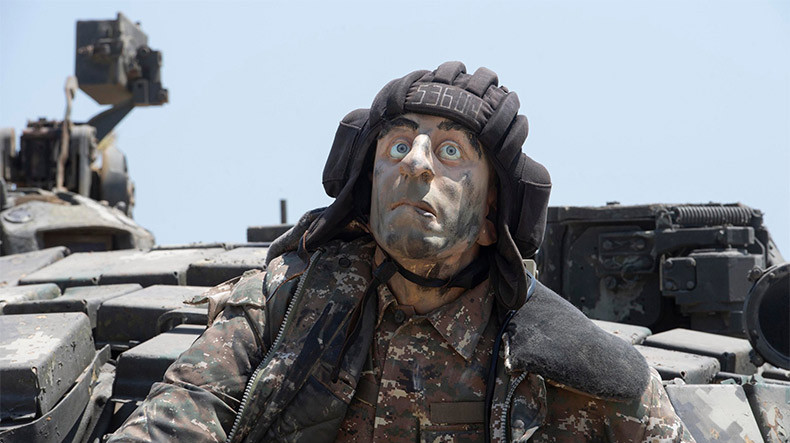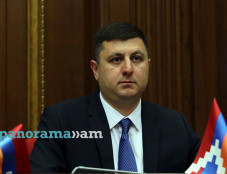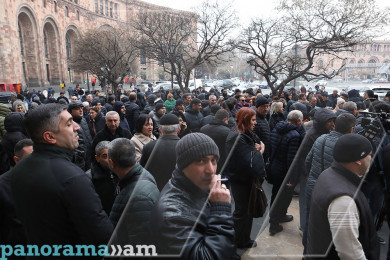
Helmet windchimes and bullet casing in the gift shop: Inside Azerbaijan's 'horrible' new war museum - The Telegraph
Reporters of British newspaper The Telegraph have visited the controversial Trophy Park in Baku dedicated to the recent Nagorno-Karabakh war and shared their impressions in a lengthy article.
Panorama.am present below the article in its entirety.
"Filled with captured enemy weaponry, Azerbaijan's new war museum is a triumphant monument to last year's defeat of Armenia in the disputed region of Nagorno-Karabakh.
Since opening in April, it has attracted crowds of enthusiastic locals, who can browse bomb-wrecked Armenian tanks and visit a snack bar and souvenir gift shop.
One thing that is missing, however, is any spirit of reconciliation. Far from being magnanimous in victory, the museum's creators have gone out of their way to humiliate their enemies, with mannequins of Armenian troops designed to look ugly.
Dressed in Armenian military uniforms, the mannequins are shown clinging to stricken vehicles and cowering in bunkers, looking terrified. They have goblin-like faces with large, hooked noses, a depiction that critics have compared to hateful portrayals of Jews.
The museum was opened in April by Azerbaijan's president, Ilham Aliyev, who described it as "evidence of our strength and the enemy's defeat."
But it has drawn condemnation from human rights rapporteurs and the Armenian government, which says it "degrades the dignity" of its 2,500 soldiers who died in last Autumn’s fighting.
Critics are particularly appalled by a display of 480 metal helmets taken from dead Armenian soldiers, some showing holes torn by bullets and shrapnel. The helmets are wired together in a curtain-style formation, and when a breeze blows, the helmets clang together in a windchime-style effect.
The Sunday Telegraph visited the museum during a recent trip to Azerbaijan's capital, Baku, where the park now sits between newly-built skyscrapers on the seafront.
"There are more than 300 Armenian tanks and armour pieces here, some of them destroyed by our Turkish drone missiles," said our museum guide.
The blood had been washed off them before they were put on display, she added.
Benches around the park have been constructed from green Armenian ammunition boxes, while illuminations marking out the pathways through the exhibits are made from artillery shells.
The snack bars, selling ice creams and burgers, are painted in camouflage green, while at the gift shop, bullet cartridges embossed with the slogan "Karabakh is Azerbaijan's" are on sale.
Azerbaijan insists its role in last year's war in Karabakh was entirely legitimate, pointing out that the area it recaptured has always been regarded internationally as sovereign Azerbaijani territory. Government officials have often accused the West of siding unfairly with Christian Armenia.
But while Western museums now agonise over "decolonising" narratives and ensuring historical equivalence, there is little attempt at balance here.
No exhibits of destroyed Azerbaijani armour are on display, and the only references to war crimes committed during last year's conflict is by Armenian troops.
Some of the Armenian mannequins are even shown chained to their vehicles - a tactic Armenian commanders deployed to stop their troops deserting, according to the museum's guides. International human rights groups say there is no evidence of such a tactic being used.
According to local media reports, the sculptors who made the Armenian mannequins deliberately designed them to look "ugly".
"We gave them hooked noses, flat heads and other features," sculptor Kamran Asadov told AzVision.
The guides at the museum appeared to agree with his comments. "The mannequins have big noses because most Armenians look that way, don't they?" said one.
Azerbaijan has dismissed a letter of complaint about the museum from Dunja Mijatović, the Council of Europe's Commissioner for Human Rights, who branded it "disturbing and humiliating”.
The Foreign Ministry insisted it "symbolises the triumph of international law and justice."
But privately, even some Azerbaijani officials are believed to be uneasy about the park's tone.
The British writer Thomas de Waal, who is the author of an acclaimed history of the Karabakh conflict and has part Jewish ancestry, described it as "horrible".
"The Jewish part of me feels this acutely," he wrote on Twitter. "In the 19th century Caucasus 'hook-nosed' 'greedy' Armenians echoed anti-Semitic tropes in Europe."
Newsfeed
Videos






























